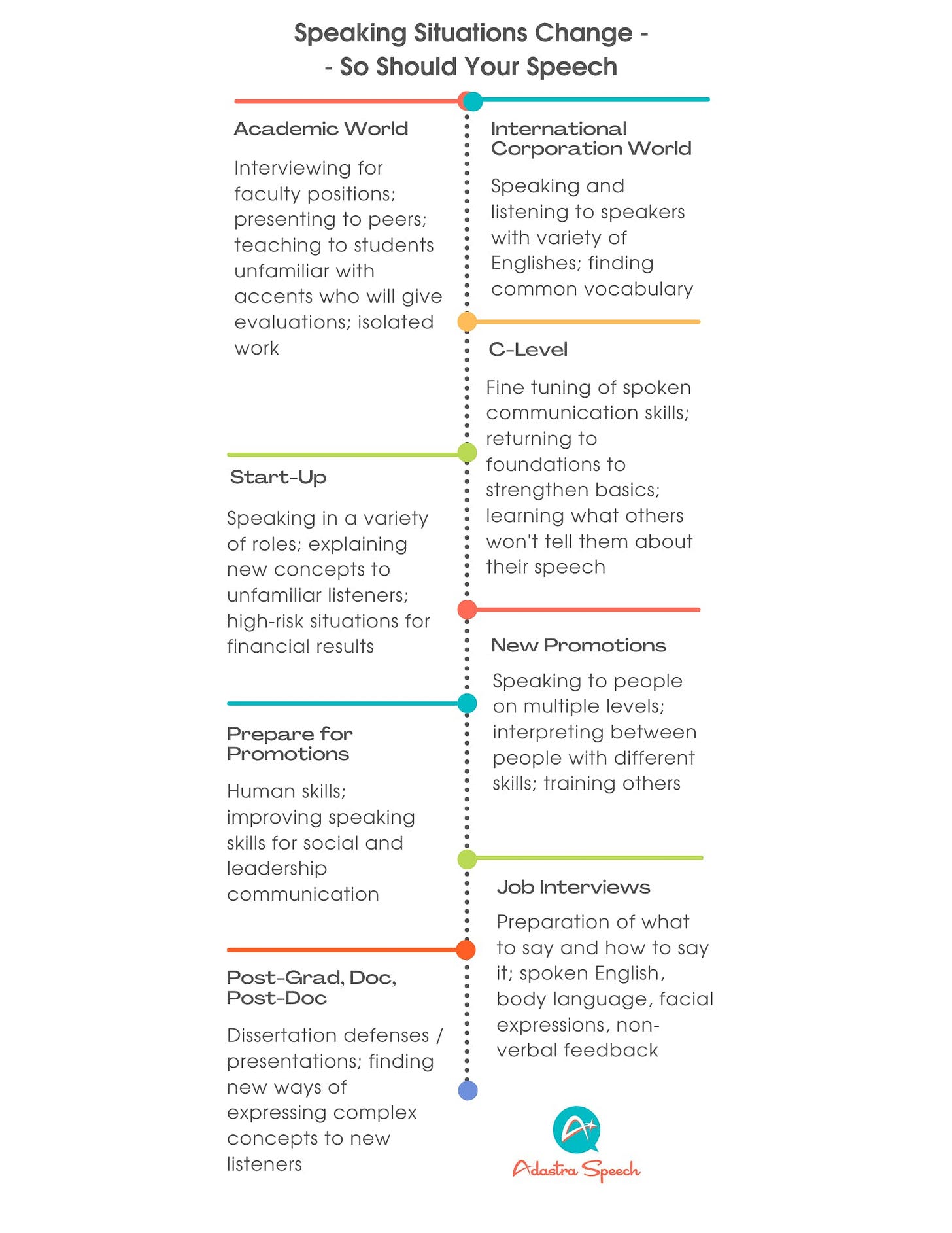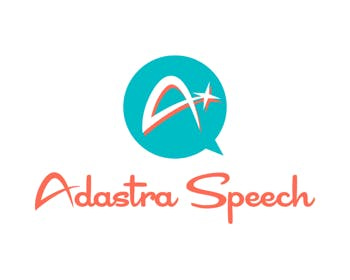Speaking Skills Throughout Your Career
Starting with Graduate School
Doc Life
I've worked with people at every level of their careers, starting with teaching undergraduates. Since I started my own private speech coaching business, the earliest I usually see people in their careers is at the graduate (master's) and post-graduate (doctoral and post-doctoral) levels of study. I can give you examples of each of the stages in the graphic above, so I'm going to start at the student level today.
Amaya's Story
Amaya had successfully graduated with her doctorate degree and was preparing for faculty interviews at US universities. She had been in the US for four years of graduate school and 3 years of doctoral studies. She had presented her dissertation to her department and colleagues and was confident about her research but wanted to get extra help to feel more prepared for these interviews. She presented her research to me just as she would in an interview and I made notes. My notes included several words that were so common to her research that she repeated them consistently throughout the presentation and, unfortunately, she consistently mispronounced all of them. Consistent is good, the listener can adapt to the same substitutions more easily than if the substitutions for sounds were constantly changing. However, I was so surprised when she told me nobody had ever told her she had been mispronouncing those important words for years. I assured her that I could understand the overall information and I got used to the substitutions being made in those words, but it was still a disheartening feeling for her to learn this after all that time.
Increased Confidence
It’s these kind of situations where people who may not understand “accent modification” (or whatever you want to call it) don’t see the effect it has on people’s self-confidence. Amaya’s goal when she started working with me wasn’t to sound just like an American English speaker, it was to gain insight into how she was communicating and learn how to make improvements. Pronouncing the important words in her research was meaningful to her and increased her confidence. That confidence doesn’t just stay with pronunciation of specific words, it also influences how someone projects their voice to be easily heard by a room full of strangers listening to their presentation and interview answers. When you’re not holding back on being heard for any reason, you’re confidence affects every aspect of how you communicate.
Speaking to a Wider Audience
Since the majority of the people I work with are in the fields of science and technology, I have worked with many doctoral and postdoctoral students in those areas. The higher you go in academics, the more your success depends on research and that requires spending a lot of time alone or in a lab with a small number of people. When you do interact with other students and professors, everyone knows the vocabulary you’re using and the general idea of what you’re talking about because it’s within a much more narrow scope than a conversation with a stranger. To present your research in front of an audience that includes people from outside your little world is stressful. You know that you’ll be asked questions that require more explanation, you may not be able to explain in the same words that you could with people inside your field, and most stressful of all, you only get one chance at a dissertation defense. When anxiety increases, the ability to recall decreases, so the ability to recall how to say something and not just what to say is compromised. That’s why starting improvement and practice of speaking about your research early is important for a successful presentation and for future job interviews.
It's Never Too Late
Some doctoral and postdoctoral students start working with me a year before they are expecting to present their research and graduate. Others only find me the week before their presentation to get my feedback and work on very specific things that will make them easier to understand. It’s a lot to take on while at the end of the dissertation and post-doc days so when someone does, I admire their dedication to detail. I’m always glad that I can give them feedback that maybe nobody else has given them, like in Amaya’s situation with pronunciation of her most important research terms.
I truly enjoy listening to these presentations and giving feedback. It’s so interesting to get a peek into a totally different world of scientific and technological research. It’s like attending a very advanced class without any pressure of having to remember anything or pass a quiz.
The Grandmother Test
When I was preparing for my dissertation defense, I was told about the “grandmother test” which means you should be able to describe your research in a way that anyone could understand, even your grandmother. Basically, someone so far outside your world that you have to consider an outsider’s perspective as they listen to you. I tell the students I work with that I am their “grandmother test.” I am unfamiliar with the vocabulary so I can’t make any guesses, I have to understand it only by pronunciation. I don’t have any background knowledge so they can’t assume I know anything about their topic. I ask questions that they probably don’t get asked by other students and professors who have that background knowledge so it’s a good way to be surprised by a question and have to answer immediately. The whole time I’m listening, I’m filtering what I’m hearing into two levels: 1) what is being said, 2) how it is being said. I give feedback on both levels to help students gain the confidence that they will be understood and that is what makes a good presentation.
This is something anyone can do without a speech coach. If you have friends who aren't familiar with your area of research or work, try presenting to them and letting them ask you questions about what words you said, what words mean, ask for more explanation about the concepts you mention, anything that helps you see your work, your presentation, and your speech from a new perspective.




